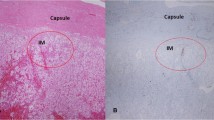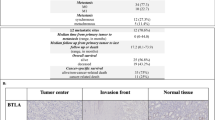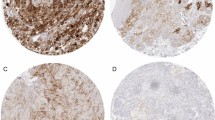Abstract
Purpose
We aimed to assess an “Immunological Profile (IP)” including CD8+ and FoxP3+ T lymphocytes for renal cell carcinoma (RCC) to evaluate its effects on tumor pathological characteristics, disease progression, and survival.
Methods
Adjacent normal and intratumoral specimens from 42 patients who had undergone radical nephrectomy for RCC were analyzed for counts of CD8+ and FoxP3+ T lymphocytes by immunohistochemistry. Tissue from both sites were evaluated and scored separately according to low (0) or high (1) expression of CD8 and FoxP3. A total score (min: 0, max: 4) was assigned to each patient. Thereafter, patients were divided into two groups for clinicopathologic and survival stratification based on score (IPWeak 0–2; and IPStrong 3–4). Survival curves were constructed using the Kaplan–Meier method, and a multivariable Cox regression model was used for overall survival (OS) and progression-free survival (PFS).
Results
The mean follow-up was 54.73 ± 21.34 months. Poor RCC characteristics including pT3–T4, tumor necrosis, lymphovascular invasion, lymph node involvement, and larger tumor size were significantly more common in the IPWeak patients compared to IPStrong (p < 0.05). Kaplan–Meier analysis showed that IPWeak patients had worse OS (62.5 vs. 100%; p = 0.006) and PFS (50 vs. 94.4%; p = 0.002) compared to IPStrong patients. In multivariable analysis, IPWeak (HR 8.64; 95% CI 1.09–68.05, p = 0.042) and high tumor node metastasis stage (HR 45.33; 95% CI 4.69–437.68, p < 0.001) were significant independent predictors of poor PFS.
Conclusion
Assessment of IP including CD8+ and FoxP3+ T lymphocytes in adjacent normal and intratumoral sites in RCC may serve as a good predictive marker for PFS.




Similar content being viewed by others
References
Capitanio U, Bensalah K, Bex A et al (2019) Epidemiology of renal cell carcinoma. Eur Urol 75(1):74–84. https://doi.org/10.1016/j.eururo.2018.08.036
Ljungberg B, Albiges L, Abu-Ghanem Y et al (2019) European association of urology guidelines on renal cell carcinoma: the 2019 update. Eur Urol 75(5):799–810. https://doi.org/10.1016/j.eururo.2019.02.011
Eggener SE, Yossepowitch O, Pettus JA, Snyder ME, Motzer RJ, Russo P (2006) Renal cell carcinoma recurrence after nephrectomy for localized disease: predicting survival from time of recurrence. J Clin Oncol 24(19):3101–3106. https://doi.org/10.1200/JCO.2005.04.8280
Harter PN, Bernatz S, Scholz A et al (2015) Distribution and prognostic relevance of tumor-infiltrating lymphocytes (TILs) and PD-1/PD-L1 immune checkpoints in human brain metastases. Oncotarget 6(38):40836–40849. https://doi.org/10.18632/oncotarget.5696
Nathan PD, Eisen TG (2002) The biological treatment of renal-cell carcinoma and melanoma. Lancet Oncol 3(2):89–96. https://doi.org/10.1016/s1470-2045(02)00650-2
Kobayashi M, Morita T, Chun NA, Matsui A, Takahashi M, Murakami T (2012) Effect of host immunity on metastatic potential in renal cell carcinoma: the assessment of optimal in vivo models to study metastatic behavior of renal cancer cells. Tumour Biol 33(2):551–559. https://doi.org/10.1007/s13277-011-0300-4
Lalani AA, McGregor BA, Albiges L et al (2019) Systemic treatment of metastatic clear cell renal cell carcinoma in 2018: current paradigms, use of immunotherapy, and future directions. Eur Urol 75(1):100–110. https://doi.org/10.1016/j.eururo.2018.10.010
Flippot R, Escudier B, Albiges L (2018) Immune checkpoint inhibitors: toward new paradigms in renal cell carcinoma. Drugs 78(14):1443–1457. https://doi.org/10.1007/s40265-018-0970-y
Anitei MG, Zeitoun G, Mlecnik B et al (2014) Prognostic and predictive values of the immunoscore in patients with rectal cancer. Clin Cancer Res 20(7):1891–1899. https://doi.org/10.1158/1078-0432.CCR-13-2830
Wang Y, Lin HC, Huang MY et al (2018) The Immunoscore system predicts prognosis after liver metastasectomy in colorectal cancer liver metastases. Cancer Immunol Immunother 67(3):435–444. https://doi.org/10.1007/s00262-017-2094-8
Li XD, Huang CW, Liu ZF et al (2019) Prognostic role of the immunoscore for patients with urothelial carcinoma of the bladder who underwent radical cystectomy. Ann Surg Oncol 26(12):4148–4156. https://doi.org/10.1245/s10434-019-07529-y
Selvi I, Demirci U, Bozdogan N, Basar H (2020) The prognostic effect of immunoscore in patients with clear cell renal cell carcinoma: preliminary results. Int Urol Nephrol 52:21–34. https://doi.org/10.1007/s11255-019-02285-0
Ling A, Edin S, Wikberg ML, Oberg A, Palmqvist R (2014) The intratumoural subsite and relation of CD8(+) and FOXP3(+) T lymphocytes in colorectal cancer provide important prognostic clues. Br J Cancer 110(10):2551–2559. https://doi.org/10.1038/bjc.2014.161
Yao JX, Chen X, Xi W et al (2018) Immunoscore system for predicting clinical outcome of metastatic renal cell carcinoma patients treated with tyrosine kinase inhibitors. J Cancer 9(22):4099–4107. https://doi.org/10.7150/jca.27408
Fritzsching B, Fellenberg J, Moskovszky L et al (2015) CD8(+)/FOXP3(+)-ratio in osteosarcoma microenvironment separates survivors from non-survivors: a multicenter validated retrospective study. Oncoimmunology 4(3):e990800. https://doi.org/10.4161/2162402X.2014.990800
Sideras K, Galjart B, Vasaturo A et al (2018) Prognostic value of intra-tumoral CD8(+) /FoxP3(+) lymphocyte ratio in patients with resected colorectal cancer liver metastasis. J Surg Oncol 118(1):68–76. https://doi.org/10.1002/jso.25091
Heng DY, Xie W, Regan MM et al (2013) External validation and comparison with other models of the International Metastatic Renal-Cell Carcinoma Database Consortium prognostic model: a population-based study. Lancet Oncol 14(2):141–148. https://doi.org/10.1016/S1470-2045(12)70559-4
Pages F, Mlecnik B, Marliot F et al (2018) International validation of the consensus immunoscore for the classification of colon cancer: a prognostic and accuracy study. Lancet 391(10135):2128–2139. https://doi.org/10.1016/S0140-6736(18)30789-X
Galon J, Lugli A, Bifulco C et al (2017) World-wide immunoscore task force: meeting report from the “Melanoma Bridge”, Napoli, November 30th–December 3rd, 2016. J Transl Med 15(1):212. https://doi.org/10.1186/s12967-017-1310-9
Guo C, Zhao H, Wang Y et al (2019) Prognostic value of the neo-immunoscore in renal cell carcinoma. Front Oncol 9:439. https://doi.org/10.3389/fonc.2019.00439
Zhou C, Diao P, Wu Y et al (2020) Development and validation of a seven-immune-feature-based prognostic score for oral squamous cell carcinoma after curative resection. Int J Cancer 146(4):1152–1163. https://doi.org/10.1002/ijc.32571
Nakano O, Sato M, Naito Y et al (2001) Proliferative activity of intratumoral CD8(+) T-lymphocytes as a prognostic factor in human renal cell carcinoma: clinicopathologic demonstration of antitumor immunity. Cancer Res 61(13):5132–5136
George DJ, Martini JF, Staehler M et al (2018) Immune biomarkers predictive for disease-free survival with adjuvant sunitinib in high-risk locoregional renal cell carcinoma: from randomized phase III S-TRAC study. Clin Cancer Res 24(7):1554–1561. https://doi.org/10.1158/1078-0432.CCR-17-2822
Huang Y, Liao H, Zhang Y et al (2014) Prognostic value of tumor-infiltrating FoxP3+ T cells in gastrointestinal cancers: a meta analysis. PLoS ONE 9(5):e94376. https://doi.org/10.1371/journal.pone.0094376
Shaban E, Bayliss G, Malhotra DK et al (2018) Targeting regulatory T cells for transplant tolerance: new insights and future perspectives. Kidney Dis (Basel) 4(4):205–213. https://doi.org/10.1159/000490703
Shi JY, Ma LJ, Zhang JW et al (2017) FOXP3 Is a HCC suppressor gene and Acts through regulating the TGF-beta/Smad2/3 signaling pathway. BMC Cancer 17(1):648. https://doi.org/10.1186/s12885-017-3633-6
Zhou Y, Shao N, Aierken N et al (2017) Prognostic value of tumor-infiltrating Foxp3+ regulatory T cells in patients with breast cancer: a meta-analysis. J Cancer 8(19):4098–4105. https://doi.org/10.7150/jca.21030
Cavalleri T, Bianchi P, Basso G et al (2019) Combined low densities of FoxP3(+) and CD3(+) tumor-infiltrating lymphocytes identify stage II colorectal cancer at high risk of progression. Cancer Immunol Res 7(5):751–758. https://doi.org/10.1158/2326-6066.CIR-18-0661
Hu G, Li Z, Wang S (2017) Tumor-infiltrating FoxP3(+) Tregs predict favorable outcome in colorectal cancer patients: a meta-analysis. Oncotarget 8(43):75361–75371. https://doi.org/10.18632/oncotarget.17722
Bedke J, Heide J, Ribback S et al (2018) Microvascular and lymphovascular tumour invasion are associated with poor prognosis and metastatic spread in renal cell carcinoma: a validation study in clinical practice. BJU Int 121(1):84–92. https://doi.org/10.1111/bju.13984
Zigeuner R, Hutterer G, Chromecki T et al (2010) External validation of the Mayo Clinic stage, size, grade, and necrosis (SSIGN) score for clear-cell renal cell carcinoma in a single European centre applying routine pathology. Eur Urol 57(1):102–109. https://doi.org/10.1016/j.eururo.2008.11.033
Shang B, Liu Y, Jiang SJ, Liu Y (2015) Prognostic value of tumor-infiltrating FoxP3+ regulatory T cells in cancers: a systematic review and meta-analysis. Sci Rep 5:15179. https://doi.org/10.1038/srep15179
Galon J, Fox BA, Bifulco CB et al (2016) Immunoscore and immunoprofiling in cancer: an update from the melanoma and immunotherapy bridge 2015. J Transl Med 14:273. https://doi.org/10.1186/s12967-016-1029-z
Acknowledgements
We would like to thank Prof Demir Kursat Yildiz for his valuable assistance and recommendations in the study.
Funding
The study was funded by the Scientific and Investigational Projects Reserve of the University of Kocaeli (Grant number 2018/138).
Author information
Authors and Affiliations
Contributions
KT: project development, data collection, data analysis, and manuscript writing/editing. BYB: data collection and data analysis. MY: data collection. AKU: data collection. MEK: data collection. HY: data analysis. OK: data analysis and manuscript writing. OD: project development, data analysis, and manuscript writing/editing.
Corresponding author
Ethics declarations
Conflict of interest
The authors declare that they have no conflict of interest.
Ethical approval
Study was approved by ethical committee of Kocaeli University School of Medicine (Approval number KÜ GOKAEK 2018/2.26).
Additional information
Publisher's Note
Springer Nature remains neutral with regard to jurisdictional claims in published maps and institutional affiliations.
Rights and permissions
About this article
Cite this article
Teke, K., Yaprak Bayrak, B., Yuksekkaya, M. et al. Prognostic value of immunological profile based on CD8+ and FoxP3+ T lymphocytes in the peritumoral and intratumoral subsites for renal cell carcinoma. Int Urol Nephrol 52, 2289–2299 (2020). https://doi.org/10.1007/s11255-020-02592-x
Received:
Accepted:
Published:
Issue Date:
DOI: https://doi.org/10.1007/s11255-020-02592-x




